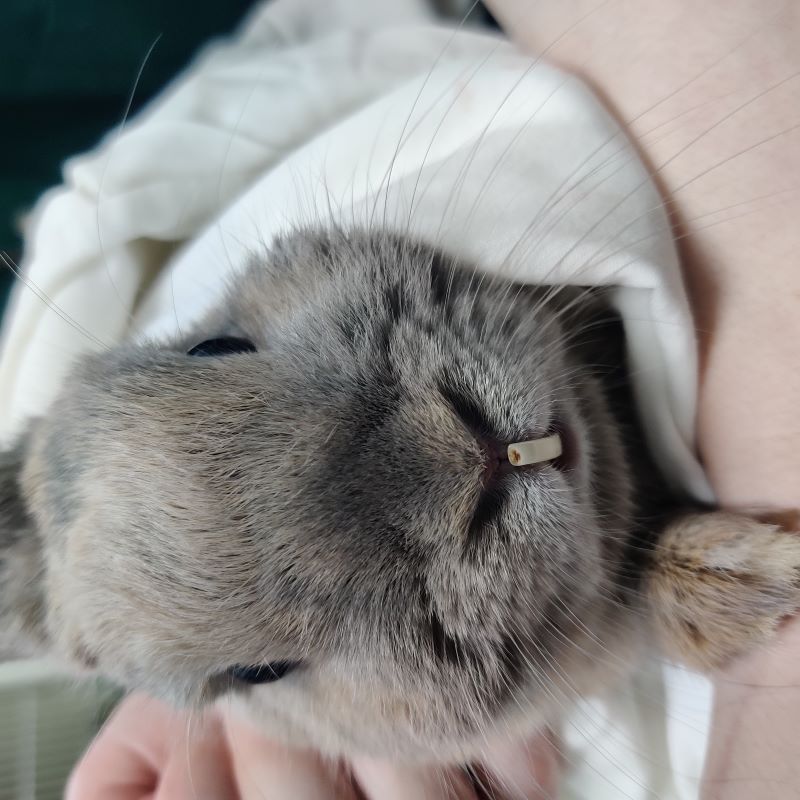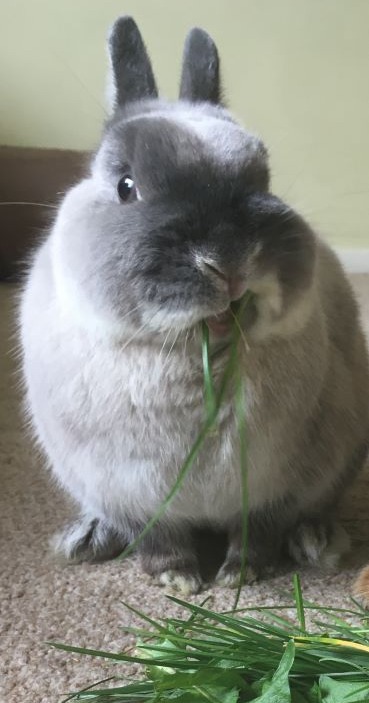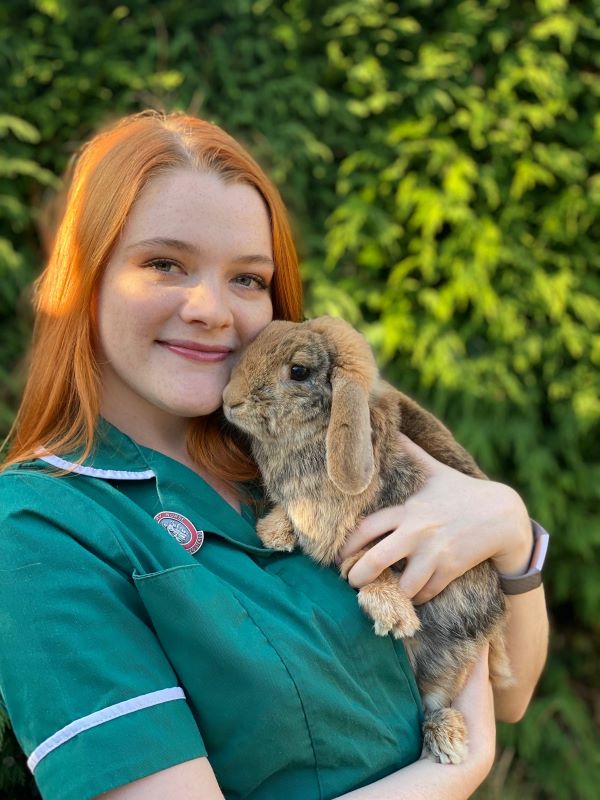New research from the RVC finds that one in seven pet rabbits suffer with dental disease
New research from the Royal Veterinary College (RVC) has identified that each year, more than one in seven companion rabbits under primary veterinary care in the UK are suffering from dental disease, a condition which can cause severe pain. The most significant demographic risk factors for rabbits in developing dental disease were found to be older age, being male, and having low bodyweight.

Veterinary professionals have always believed dental disease to be one of the most common and serious disorders in companion rabbits, often resulting in significant pain, enforced selective eating and behavioural changes in the animal, but now this new study provides evidence to show the true scale of the issue.
Previous studies suggested that lop ear and brachycephalic (flat-faced) skull conformations were associated with an increased risk of dental disease, but those studies were limited by small sample size and selection bias. This new study, therefore, aimed to strengthen the evidence base on demographic and conformational risk factors for dental disease in rabbits by using the largest sample of rabbits ever investigated for a study of this kind.
The RVC research team, consisting of experts from VetCompass, the Animal Welfare team, Exotics team and an MRes (Master of Research) student, collated patient records from 161,979 rabbits under UK first opinion veterinary care in 2019. A random sample of 2,219 confirmed cases of dental disease was extracted and compared against 117,890 rabbits without recorded dental disease. Using these data, the team analysed conformational characteristics, including ear type and skull shape of the rabbits, to explore associations with the disease.

The research found that a significant 15.36% of all rabbits were formally diagnosed with dental disease in 2019, though this figure may only be the tip of the iceberg, with many more rabbits believed to be affected but not formally diagnosed. Of the rabbits diagnosed, there were 3.14% with incisor teeth affected and 13.72% with cheek teeth affected. Over half of the affected rabbits (8.20% of all rabbits) were newly diagnosed with dental disease in 2019.
The findings identified that older age, lower bodyweight and being male were the most important demographic risk factors for rabbits in developing dental disease. Additional findings also include that:
- Lop-eared compared to erect-eared rabbits, and brachycephalic skull shapes compared to normocephalic skull shapes, were not significant risk factors for dental disease, suggesting the conformation of a rabbit plays a much lesser role in whether the animal develops the disease than other factors such as age and diet.
- Rabbits that were five years old and older had 7.58 times the risk of dental disease compared to rabbits aged less than one.
- Rabbits weighing more than 2kg had a significantly lower risk of developing dental disease compared with rabbits weighing less than 1.49kg.
- Male rabbits had a 1.23 times higher risk of having dental disease than female rabbits.
This research highlights a dental disease crisis in pet rabbits and suggests that all companion rabbits would benefit from regular dental examinations, irrespective of breed, ear type or skull shape. Particular emphasis should be placed on rabbits with a lower-than-expected bodyweight, that are older or male. Owners should also be vigilant for subtle signs of dental issues, such as selective eating, reluctance to eat hay, drooling and pawing at the face. Owners with any concerns about dental disease in their rabbit should seek advice from their veterinary practice.
Maria Jackson, Veterinary Nurse and Research Assistant in Rabbit Health at the RVC, and lead author of the paper, said:

“Despite being the third most popular pet in the UK, I feel rabbits have been largely overlooked in companion animal research. Our study shows over 230,000 pet rabbits in the UK may be suffering with dental disease at this moment in time. Routine dental checks and feeding a diet predominantly of good quality hay is clearly important for all our rabbits, not just those with lopped ears or a short face.”
Dr Dan O’Neill, Associate Professor of Companion Animal Epidemiology at RVC, and co-author of the study, said:
“This new research highlights a major welfare crisis in pet rabbits caused by dental disease. Owners have a legal duty to protect their animals from unnecessary suffering. This can begin with ensuring all rabbits get an appropriate diet of mainly hay and grass. The biggest single risk factor for pet rabbits developing dental disease appears to be captivity.”
Dr Charlotte Burn, Associate Professor in Animal Welfare and Behaviour Science at the RVC, said:
“Any rabbit can suffer dental disease, and these new findings suggest that owners and vets should particularly watch out for it as rabbits get older, especially if the rabbits are thin and male.
“Interestingly, this very large study didn’t show any association between rabbit head and ear shape and dental disease at all, casting doubt on whether brachycephalic and lop-eared rabbits may be more affected than other rabbits.”
This study was supported by a grant from the Universities Federation for Animal Welfare (UFAW).
Dr Huw College, Chief Executive and Scientific Director of UFAW, said:
“A crucial part of our work as an animal welfare charity is providing grants and awards to support innovative research which helps us better understand animal welfare problems. We were therefore delighted to support this study which has advanced our understanding of dental disease in pet rabbits and suggested some practical steps to improving welfare for these animals too.”
This research was funded by RVC Animal Care Trust.
Notes to Editors
Reference
Jackson MA, Burn CC, Hedley J, Brodbelt DC, O'Neill DG. Dental disease in companion rabbits under UK primary veterinary care: Frequency and risk factors. Vet Rec. 2024;e3993.
The full paper is available from Vet Record and can be accessed here: https://bvajournals.onlinelibrary.wiley.com/doi/10.1002/vetr.3993
For media enquiries, please contact:
- Jasmin De Vivo at jasmin.devivo@plmr.co.uk or rvc@plmr.co.uk
- Press Line: 0800 368 9520
About the RVC
- The Royal Veterinary College (RVC) is the UK's largest and longest established independent veterinary school and is a Member Institution of the University of London.
- It is one of the few veterinary schools in the world that hold accreditations from the RCVS in the UK (with reciprocal recognition from the AVBC for Australasia, the VCI for Ireland and the SAVC for South Africa), the EAEVE in the EU, and the AVMA in the USA and Canada.
- The RVC is ranked as the top veterinary school in the world in the QS World University Rankings by subject, 2023.
- The RVC offers undergraduate and postgraduate programmes in veterinary medicine, veterinary nursing and biological sciences.
- The RVC is a research-led institution, with 88% of its research rated as internationally excellent or world class in the Research Excellence Framework 2021.
- The RVC provides animal owners and the veterinary profession with access to expert veterinary care and advice through its teaching hospitals and first opinion practices in London and Hertfordshire.
About the VetCompass™ Programme
VetCompass™ (The Veterinary Companion Animal Surveillance System) is an epidemiological research programme at the Royal Veterinary College (RVC) which investigates anonymised clinical records from veterinary practices to generate evidence to support improved animal welfare. VetCompass shares information from more than 1,800 veterinary practices in the UK (over 30% of all UK practices) covering over 28 million companion and equine animals. To date, VetCompass™ has led to over 130 peer-reviewed publications that have supported welfare-focused work across the range of animal stakeholders including the wider general public, owners, breeders, academics, animal charities, universities and government.
For more information, visit: https://www.rvc.ac.uk/vetcompass
X (Twitter): @VetCompass
About the Universities Federation for Animal Welfare (UFAW)
The Universities Federation for Animal Welfare (UFAW) is an international independent scientific and educational animal welfare charity and membership organisation. UFAW’s vision is a world where the welfare of all animals affected by humans is maximised through a scientific understanding of their needs and how to meet them. UFAW promotes an evidence-based approach to animal welfare by funding scientific research, supporting the careers of animal welfare scientists and by disseminating animal welfare science knowledge both to experts and the wider public.
UFAW’s work relies on the support of members, subscribers, and donors. To learn more about our work, to become a member of UFAW, or to donate, please visit www.ufaw.org.uk/
Media Contact: Carly Halliday (media@ufaw.org.uk)
You may also be interested in:
-
A painful tail: RVC research reveals which dogs have greatest risk of a tail injury
A new study from the Royal Veterinary College (RVC) has found that the Boxer, English Springer …


